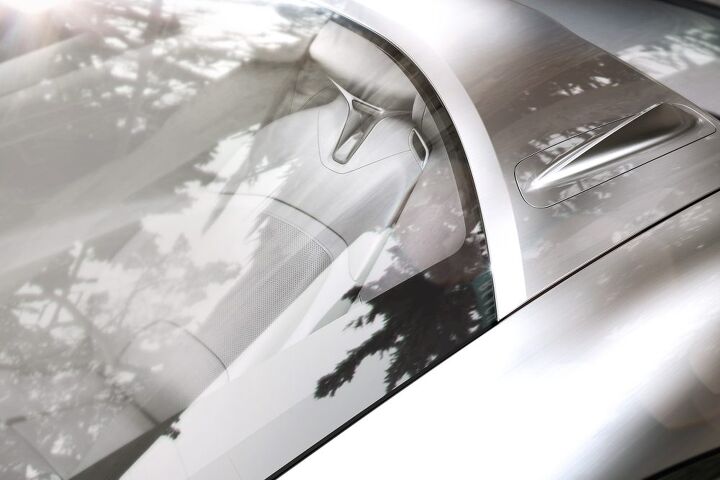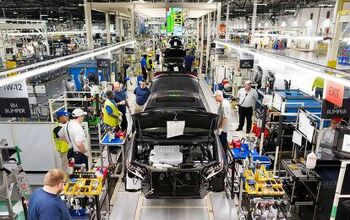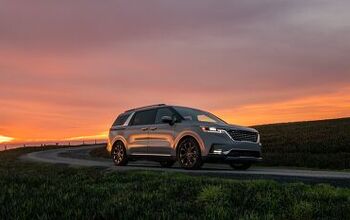TTAC News Round-up: Atieva Has a New Name and a New Sedan That Desperately Needs One

Atieva has a luminous new name for its company and a lightning-fast sedan without one.
That, the future of autonomous driving doesn’t need to include stopping for red lights, defective Takata airbags have claimed another life, and the E-Class is helping keep Daimler filthy stinking rich… after the break!
Atieva loses its name but gains a sedan
After showboating a video of their blisteringly fast all-electric van beating high-performance sports cars for a few weeks, Atieva changed its name and held an intimate media gathering to show off their new car. CNET reports that Atieva — now “Lucid Motors” — has come up with a spacious midsized sedan with a low nose and large greenhouse. But will it be as fast as the super-van?
More or less, with an emphasis on more. The electric’s 87 kWh power source has an output of more than 900 horsepower. That’s down on the van’s 1200 hp, but Lucid’s Chief Technology Officer Peter Rawlinson says the sedan will weigh half of a ton less. It also won’t have the brick-like aerodynamics of a van.
The model, currently without a name, also aims to rival Tesla in terms of technology. Lucid Motors says it will have fully self-driving capability baked in, data connection for software updates, and possess an infotainment system with four OLED screens. It should also support a minimum range of 300 miles on a charge.
While this is not a production model, Lucid says it is extremely close to what you can expect. That doesn’t guarantee anything, but it’s fairly amazing progress for something only in development for a couple of years. The company wants to wants to unveil the final incarnation by the end of the year and bring it to market in 2018.
For the first time ever, Jaguar Land Rover and Ford are testing connected cars that can communicate with each other using technology designed to expedite trips and avoid accidents. Currently undergoing testing in central England, the connected vehicles monitor traffic signals and each other to adjust their speed in order to hit fewer red lights.
If you’re worried this will make them drive like feather-footed hypermilers, don’t worry. Automotive News Europe reports a driverless Range Rover Sport was demonstrated automatically overtaking slower moving cars.
“The benefits of having cars that can communicate with each other and their surroundings could be very significant – from increased road safety to improved traffic flow,” said Tim Armitage, a project director at the government-backed UK Autodrive.
Earlier this month, a driverless car was tested on British streets for the first time as part of government efforts to create an industry to serve a worldwide market. That market is estimated to be worth up to £900 million ($1.1 billion U.S.) by 2025.
Britain aims to have driverless cars on its roads by the end of the decade.
Takata airbags have killed another Honda driver
American Honda Motor Co. and U.S. regulators have confirmed that a 50-year-old California woman is the eleventh victim of rupturing Takata airbags, Automotive News reports.
The woman’s 2001 Honda Civic was among the over 300,000 Honda and Acura vehicles that the U.S. National Highway Traffic Safety Administration warned owners in June to stop driving, citing a “grave danger.” The vehicles contain defective Takata inflators that increase the likelihood that the airbag could rupture in a crash by as much as 50 percent, according to NHTSA.
Almost 70 million Takata inflators in U.S. vehicles will be recalled by 2019 under a sweeping recall plan being coordinated by the NHTSA. 11.4 million Takata recalled inflators have been replaced as of Oct. 7, accounting for only 36 percent of the total number of airbags currently under recall.
The inflator defect has crippled Takata financially, and has led to deaths and over 100 injuries in the United States alone.
The E-Class is helping Daimler avoid leaner times
Fortune reports that stronger sales of Daimler’s tech-heavy Mercedes-Benz E-Class sedan and, of course, SUVs, helped third-quarter operating profits swell by 23 percent.
Daimler Trucks, the company’s second-largest source of revenue, just fell off a 2015 high as sales and demand plummeted in its core markets. The division issued a profit warning in May and has predicted job cuts.
But with higher earnings from passenger cars offsetting the falling demand for their trucks, Daimler may soon overtake BMW AG as the world’s biggest premium car manufacturer.
CEO Dieter Zetsche said the results prove “one more time that we are pursuing the right strategy.”
[Images: Lucid Motors; Mercedes-Benz]

A staunch consumer advocate tracking industry trends and regulation. Before joining TTAC, Matt spent a decade working for marketing and research firms based in NYC. Clients included several of the world’s largest automakers, global tire brands, and aftermarket part suppliers. Dissatisfied with the corporate world and resentful of having to wear suits everyday, he pivoted to writing about cars. Since then, that man has become an ardent supporter of the right-to-repair movement, been interviewed on the auto industry by national radio broadcasts, driven more rental cars than anyone ever should, participated in amateur rallying events, and received the requisite minimum training as sanctioned by the SCCA. Handy with a wrench, Matt grew up surrounded by Detroit auto workers and managed to get a pizza delivery job before he was legally eligible. He later found himself driving box trucks through Manhattan, guaranteeing future sympathy for actual truckers. He continues to conduct research pertaining to the automotive sector as an independent contractor and has since moved back to his native Michigan, closer to where the cars are born. A contrarian, Matt claims to prefer understeer — stating that front and all-wheel drive vehicles cater best to his driving style.
More by Matt Posky
Latest Car Reviews
Read moreLatest Product Reviews
Read moreRecent Comments
- UnoGeeks Great information. Unogeeks is the top SAP ABAP Training Institute, which provides the best SAP ABAP Training
- ToolGuy This thing here is interesting.For example, I can select "Historical" and "EV stock" and "Cars" and "USA" and see how many BEVs and PHEVs were on U.S. roads from 2010 to 2023."EV stock share" is also interesting. Or perhaps you prefer "EV sales share".If you are in the U.S., whatever you do, do not select "World" in the 'Region' dropdown. It might blow your small insular mind. 😉
- ToolGuy This podcast was pretty interesting. I listened to it this morning, and now I am commenting. Listened to the podcast, now commenting on the podcast. See how this works? LOL.
- VoGhost If you want this to succeed, enlarge the battery and make the vehicle in Spartanburg so you buyers get the $7,500 discount.
- Jeff Look at the the 65 and 66 Pontiacs some of the most beautiful and well made Pontiacs. 66 Olds Toronado and 67 Cadillac Eldorado were beautiful as well. Mercury had some really nice looking cars during the 60s as well. The 69 thru 72 Grand Prix were nice along with the first generation of Monte Carlo 70 thru 72. Midsize GM cars were nice as well.The 69s were still good but the cheapening started in 68. Even the 70s GMs were good but fit and finish took a dive especially the interiors with more plastics and more shared interiors.






































Comments
Join the conversation
Who owns the responsibility to safe these Honda/Acura cars until they are fixed? This latest victim's family could claim: - It was her only car, so she *had* to drive it, and Honda should have given her a loaner, or, - She was unaware of the notice recommending it be parked, or - Takata's fix is too long in coming. These time bombs are killing more Americans than ISIS, but the resources devoted to fighting them surely aren't the same.
LUCID 'LECTRIK